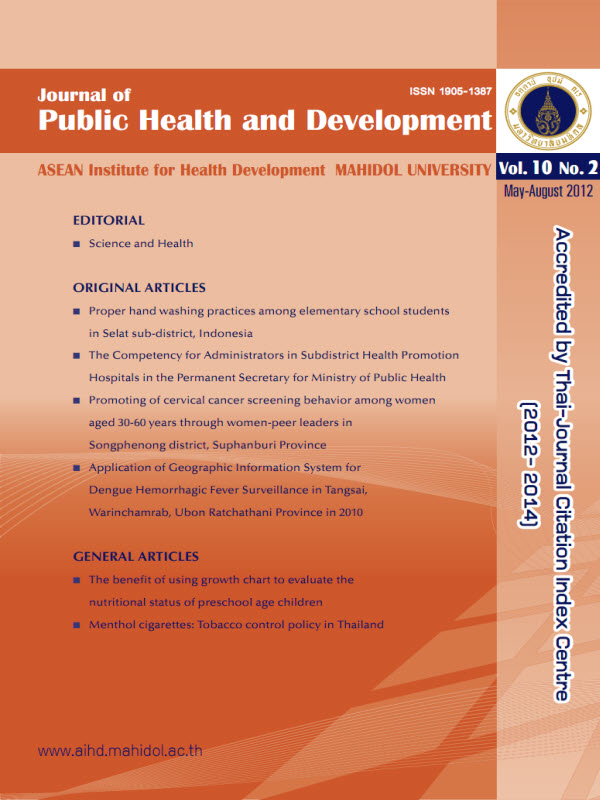Promoting of cervical cancer screening behavior among women aged 30-60 years through women-peer leaders in Songphenong district, Suphanburi Province.
Main Article Content
Abstract
This quasi-experimental research - the pretest-posttest design with nonequivalent group aimed
to evaluate the effectiveness of promotion intervention of cervical cancer screening test through
woman-peer leaders. Respondents were women aged 30-60 years in Songphenong district, Suphanburi
province. The 254 and 258 women in the responsible areas of Bangplab Subdistrict Health Center
and that of Srisamrarn Subdistrict Health Center were assigned to experimental and comparison
groups respectively. Target women in the experimental group received promotion intervention of
cervical cancer screening test, delivered by 15 trained woman-peer leaders. The trained leaders were
assigned to persuade and educate target women for six weeks, using one-on-one basis - knock
door approach combined with flip-charts developed by the researchers, and home visit follow-up
once a week after the first contact; whereas those in the comparison group received only an invited
letter for taking cervical cancer screening and then they were encouraged by health personnel. Data
were collected for two times, at baseline and after six weeks of intervention, by using a structured
questionnaire. Paired t-test, Student’s t-test and Z-test were used to analyze the data. The results
showed significant increase of perceived susceptibility and severity of cervical cancer as well as
perceived benefit of cervical cancer screening, and significant decrease of perceived barrier of cervical
cancer screening after the intervention in both groups. However, women in the experimental
group had more significant improvement in their perceptions than those in the comparison group
(p-value<0.001). After the intervention, the proportion of women obtaining cervical cancer screening
tests in the experimental group (82.7%) was significantly higher than that in the comparison
group (28.7%) (p-value<0.001). The evaluation results indicated that the promotion intervention of
cervical cancer screening behavior was effective, and it should, therefore, be applied to other areas.
to evaluate the effectiveness of promotion intervention of cervical cancer screening test through
woman-peer leaders. Respondents were women aged 30-60 years in Songphenong district, Suphanburi
province. The 254 and 258 women in the responsible areas of Bangplab Subdistrict Health Center
and that of Srisamrarn Subdistrict Health Center were assigned to experimental and comparison
groups respectively. Target women in the experimental group received promotion intervention of
cervical cancer screening test, delivered by 15 trained woman-peer leaders. The trained leaders were
assigned to persuade and educate target women for six weeks, using one-on-one basis - knock
door approach combined with flip-charts developed by the researchers, and home visit follow-up
once a week after the first contact; whereas those in the comparison group received only an invited
letter for taking cervical cancer screening and then they were encouraged by health personnel. Data
were collected for two times, at baseline and after six weeks of intervention, by using a structured
questionnaire. Paired t-test, Student’s t-test and Z-test were used to analyze the data. The results
showed significant increase of perceived susceptibility and severity of cervical cancer as well as
perceived benefit of cervical cancer screening, and significant decrease of perceived barrier of cervical
cancer screening after the intervention in both groups. However, women in the experimental
group had more significant improvement in their perceptions than those in the comparison group
(p-value<0.001). After the intervention, the proportion of women obtaining cervical cancer screening
tests in the experimental group (82.7%) was significantly higher than that in the comparison
group (28.7%) (p-value<0.001). The evaluation results indicated that the promotion intervention of
cervical cancer screening behavior was effective, and it should, therefore, be applied to other areas.
Article Details
How to Cite
1.
Wetwisit N, Vatanasomboon P, Termsirikulchai L. Promoting of cervical cancer screening behavior among women aged 30-60 years through women-peer leaders in Songphenong district, Suphanburi Province. J Public Hlth Dev [internet]. 2012 Sep. 11 [cited 2026 Feb. 24];10(2):36. available from: https://he01.tci-thaijo.org/index.php/AIHD-MU/article/view/2645
Section
Original Articles


